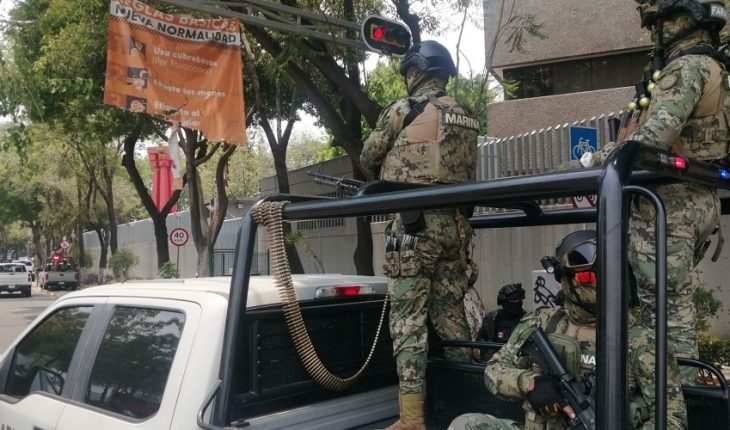Miguel Angel Rodríguez Frayde was 20 years old when he disappeared in Nuevo Laredo, Tamaulipas. On April 17, 2018, he left his home with two friends and has never been seen again. The only clue Martha Frayde Medina, her mother, has is a visit she received the next day. Two young men came to his house and told him that the young man had been captured by agents of the Navy secretariat (Semar). Since then Frayde has been searching, without success.
The Attorney General’s Office (FGR) has 34 investigative folders open on 47 disappearances attributed to the Navy Special Operations Group between February and May 2018. Rodriguez Frayde’s case isn’t among them. The institution refuses to take over the investigation and the folder remains in the Attorney General’s Office of Tamaulipas. On 15 April, 30 sailors were linked to the process for the disappearance of four people and will remain in prison as investigations progress.
Nor did the National Commission on Human Rights (CNDH) include the history of the young person in its recommendation 36VG/2020, which points to the Navy for the disappearance of 27 people and the possible extrajudicial execution of 12 of them.
“For my son there is no search or anything. I don’t exist in investigations,” says Martha Frayde, in a phone interview. The arrest of the 30 sailors has given him hope. “They have to know what happened,” he says.
Animal Politics consulted with the FGR, but at the close of the edition had received no response.
Rodriguez Frayde’s disappearance is a story that is repeated too often. His mother works in a factory on night shifts, so she spends much of the day sleeping. When his son left the house with two other friends, he didn’t worry. He thought he would have gone looking for work, as he had recently left his job as a security watchman. Nothing made him think that farewell was the last.
More than 87,000 missing persons are registered in Mexico according to the National Search Commission. Of these, more than 11,000 are missing in Tamaulipas, the second-highest number of missing persons, second only to Jalisco, with more than 12 thousand.
A single testimony
“Every day he left home, he was a very restless boy,” says Frayde Medina, who did not care that the young man spent all day away from home as he was forbidden to go with friends inside the house. The next day he started the nightmare.
“Two young boys came in a car, they looked scared. I was told the Navy had captured him in the Mexico Two release and they left. I haven’t heard from them again,” he says. In the area where he was allegedly captured there are no video cameras or shops that could testify to what happened.
From then on, a long pilgrimage without answers begins for women. First, to the Public Safety Directorate, where they tell him that their son is not being held there. Then to the FGR, military barracks and bases of operations of the Semar, which were still active in Nuevo Laredo. In all of them they told him they knew nothing about their son.
“I went out on the street and so much boy I saw looked like him,” explains the woman, who didn’t dare ask too much about the young man’s whereabouts. I was afraid someone would come in and tell him, like so many other people, to stop looking because he’d already been killed. “These kinds of answers end you morally,” he says.
It was hard months in Nuevo Laredo, a municipality marked by the violence of organized crime and the Armed Forces. At the time, news of disappearances allegedly perpetrated by sailors and bodies appearing semi-buried in uninhabited areas was repeated.
The family was doubly beaten. On April 28, just 10 days after the disappearance of Miguel Angel, José Eugenio Hernández Romero, 14, son of María Dolores Romero, Martha’s cousin, was captured. His body appeared semi-buried in a New Lion’s place.
After several months frightened, without daring to denounce her case, she turned to the Human Rights Committee of Nuevo Laredo, the collective that brings together a large part of the families of the disappeared at the hands of the Navy.
“Amazing game”
“There is a perverse game between the state and the FGR not to investigate,” says Raymundo Ramos, president of the association. He explains that the Tamaulipas Prosecutor’s Office sent the investigative folder to the FGR claiming that the defendants were sailors, but that the FGR rejected it. Even the legal advice of the Executive Commission on Victim Care (CEAV) requested in writing that the case leave the state, without success. “So far it has notn responded and we only have one complaint left before the CNDH,” says Ramos.
The activist denounces that the young man’s search was “a mere procedure” that has shed no light. “There’s no research,” he says. The protocol merely requests information in writing from public ministries, hospitals, prisons and uploading their DNA to a platform.
Frayde Medina’s hope, like many other families, is in the statements of sailors linked to the disappearance process and who are in the military camp prison in Mexico City. So far he has not transcended what his testimony was before the judge, but his relatives reported that they were detained with deception.
“I hope the relatives soften the sailors and they speak. I hope justice is done. I don’t care if they take the bosses. They obeyed orders and have to pay,” she says.
At the moment the case of Miguel Angel Rodríguez Frayde is in s still place. There are no investigations to go ahead or clues to follow. His mother clings to the only runway he has, that of the sailors. Trust the FGR to resume the case and may one day know what happened to your child.
What we do at Animal Politics requires professional journalists, teamwork, dialogue with readers and something very important: independence. You can help us keep going. Be part of the team.
Subscribe to Political Animal, receive benefits and support free journalism #YoSoyAnimal.





